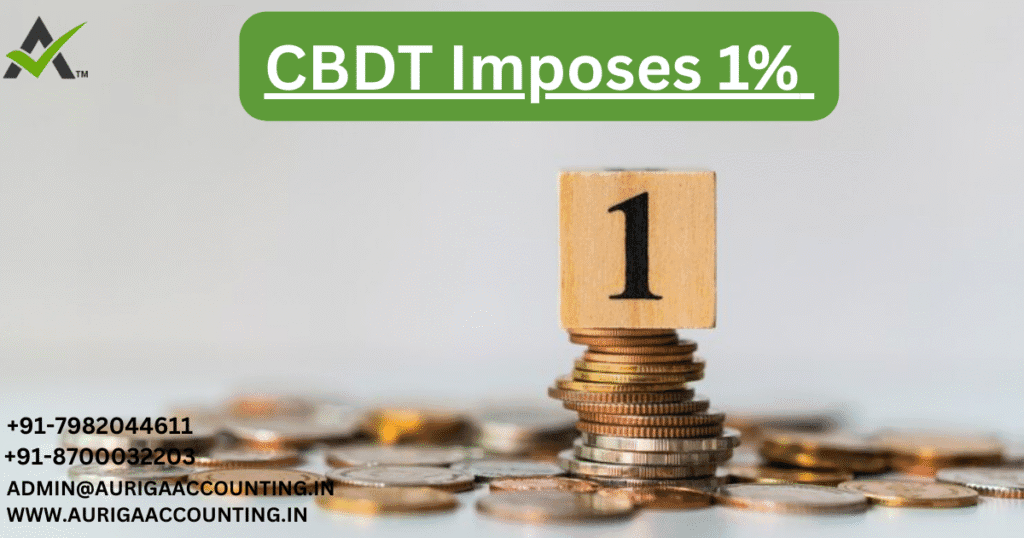The Central Board of Direct Taxes (CBDT) has issued a new notification imposing a 1% Tax Collected at Source (TCS) on the purchase of specified luxury goods exceeding ₹10 lakh in value. This regulation came into force on April 22, 2025. In this article, we’ll explore the scope of the directive, which luxury items are included, the applicable threshold for TCS, and key implications for both buyers and sellers.

CBDT Imposes 1%
Introduction
ToggleCBDT Imposes 1% TCS on Luxury Goods Purchases Exceeding ₹10 Lakh
What’s New in TCS on Luxury Goods?
Previously, luxury goods were not subject to Tax Collected at Source (TCS). However, under the latest notification from the Central Board of Direct Taxes (CBDT), a 1% TCS is now applicable on the sale of specified luxury items valued above ₹10 lakh. Sellers are responsible for collecting this tax at the time of transaction and depositing it against the buyer’s PAN.
This collected TCS will appear in the buyer’s Form 26AS and can be claimed as a tax credit while filing their Income Tax Return (ITR). If the TCS amount exceeds the buyer’s actual tax liability, the surplus can be claimed as a refund
Luxury Goods Covered Under TCS
The CBDT notification outlines specific high-value items that will attract 1% TCS if the transaction exceeds ₹10 lakh. These include:
Luxury wristwatches
Artworks (antiques, paintings, sculptures)
Collectibles (coins, stamps, etc.)
Yachts, canoes, rowing boats, helicopters
Designer sunglasses
Premium bags (including handbags and purses)
High-end footwear
Sports gear (e.g., golf kits, ski equipment)
Advanced home theatre systems
Race or polo horses
TCS Applicability Threshold
The TCS provision applies only if the transaction value of these luxury goods exceeds ₹10 lakh.
For example, if someone purchases a luxury watch worth ₹12 lakh, the seller must collect 1% of the sale price—₹12,000—as TCS.
This rule mirrors the existing TCS requirement for motor vehicle purchases above ₹10 lakh
TCS Rate for Luxury Goods
Applicable Rate: 1% of the sale value
Illustration: For a luxury item priced at ₹30 lakh, TCS of ₹30,000 will be collected by the seller.
Effective Date
While the proposal was announced during the Union Budget 2024, the formal implementation began with a CBDT notification dated April 22, 2025. The rules took immediate effect from this date.
Regulatory Update: Amendment to Tax Rules
To implement the new provisions, the CBDT introduced the Income-tax (Eleventh Amendment) Rules, 2025, amending the existing Income-tax Rules, 1962.
Key procedural change:
Form 27EQ (used for quarterly TCS filings) now includes new reporting codes specifically for luxury goods under Section 206C(1F)
Key Takeaways on TCS for Luxury Goods
For Buyers:
1% TCS Applicability: A 1% Tax Collected at Source will be levied on luxury goods purchases exceeding ₹10 lakh at the time of payment.
PAN-Based Credit: The TCS amount will be linked to your Permanent Account Number (PAN).
Form 26AS Credit: This tax will reflect in your Form 26AS and can be claimed as a credit when filing your Income Tax Return (ITR).
Refund Option: If your total tax liability is lower than the TCS collected, the surplus can be claimed as a refund.
For Sellers:
TCS Collection Duty: Sellers must collect 1% TCS on specified luxury goods priced above ₹10 lakh during the sale.
Deposit Against PAN: The collected tax must be deposited against the buyer’s PAN.
Mandatory Reporting: TCS must be reported accurately in Form 27EQ as part of quarterly returns.
TCS Certificate Issuance: Sellers are required to issue a TCS certificate, which enables buyers to claim the tax credit in their ITR
Ensure Compliance with IndiaFilings!
Dealing with high-value luxury goods? Whether you’re a buyer seeking to claim tax credit or a seller managing new TCS responsibilities, IndiaFilings offers expert assistance to help you stay fully compliant.
Accurate TCS filing
Timely ITR submission
Hassle-free documentation
Get in touch with IndiaFilings today for personalized support
About the Author
DINESH P
Dinesh Pandiyan is a skilled content writer specializing in business registration, tax laws, trademark regulations, and corporate compliance. His well-researched and practical articles provide readers with straightforward guidance, helping businesses effectively navigate India’s legal and regulatory landscape



